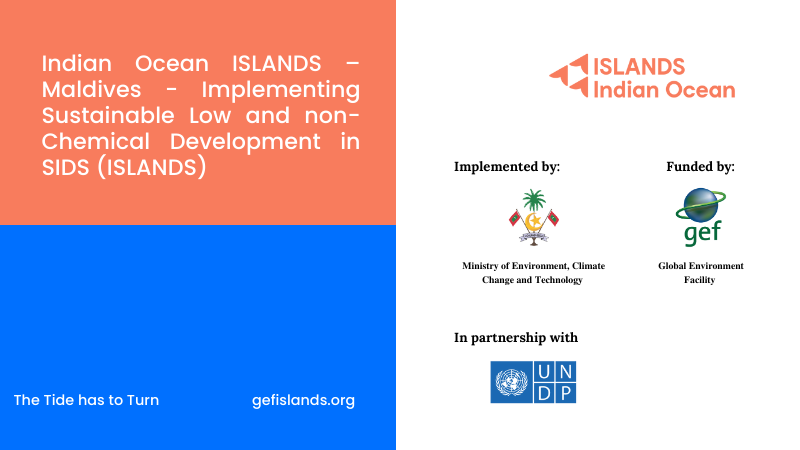Introduction
This project in Maldives is part of the “Indian Ocean Child Project” that will be implemented by UNDP in four Small Island Developing States (SIDS): Union of Comoros, Maldives, Mauritius and Seychelles. The objective of the Indian Ocean Regional Project is for each participating SIDS to prevent the future build-up of materials and chemicals entering SIDS that contain POPs and mercury and other harmful chemicals; to safely manage and dispose of existing harmful chemicals, products and materials currently present in those SIDS; and to ensure the safe management of products continuing to enter SIDS by closing materials and product loops. The ultimate objective of the project is to protect human health and the environment from the harmful effects of hazardous chemicals and wastes.
The Maldives component will support key actions included in the Strategic Action Plan (SAP) of the Government of Maldives (2019). In particular, the project will focus on strengthening institutional mechanisms and capacity to manage hazardous wastes. This will include conducting a comprehensive supply chain analysis of imported pesticides and a nation-wide hazardous waste inventory; Developing guidelines for the sound management and disposal of priority hazardous waste streams; Conducting a feasibility study for the establishment of a centralized interim hazardous waste storage and export facility; Ensuring the sound management of an additional 500 tonnes of hazardous wastes by establishing regional private sector capacity and developing partnerships between national and regional recyclers and transport companies; Establishing partnerships between hotel chains in the Maldives, Mauritius and Seychelles to support the adoption of a green label certification process; Developing feasible economic instruments to support the sound management of (hazardous) wastes; and, Creating awareness of 175,892 people (86,328 women and 89,564 men) on the sound management of chemicals and wastes and introduction of safer and environmentally friendlier alternatives and practices. Furthermore, the project will enhance national capacity to prevent, monitor, manage and export/treat hazardous wastes and priority waste streams.
The Indian Ocean Child Project is one of five (5) child projects that is part of a GEF funded UN Environment led global programme entitled “Implementing Sustainable Low And Non-Chemical Development in SIDS” (“the GEF ISLANDS Programme”), which will be implemented in 30 SIDS across 3 regions (Caribbean, Indian Ocean and Pacific). The GEF ISLANDS Programme also contains a global coordination, knowledge management and communication child project, which will share knowledge and experiences across all regions to address challenges posed by chemicals and wastes common to all SIDS and to stimulate inter-regional cooperation on these issues.
Project Objective
The objective of the Indian Ocean Regional Project is for each participating SIDS to:
- Prevent the future build-up of materials and chemicals entering SIDS that contain POPs and mercury and other harmful chemicals;
- Safely manage and dispose of existing harmful chemicals, products and materials currently present in those SIDS;
- Ensure the safe management of products continuing to enter SIDS by closing materials and product loops.
The ultimate objective of the project is to protect human health and the environment from the harmful effects of hazardous chemicals and wastes.
Project outcome:
- Maldives has in place effective mechanisms to control the import of chemicals, and products that lead to the generation of hazardous waste.
- Harmful chemicals and materials present and/or generated in the Maldives are being disposed of in an environmentally sound manner.
- Build-up of harmful materials and chemicals is prevented through establishment of effective circular and life-cycle management systems in partnership with the private sector.
- Knowledge generated by the programme is disseminated to, and applied by, SIDS in all regions.
Partners involved:
- Ministry of Environment, Climate Change and Technology
- Ministry of Defense
- Ministry of National Planning, Housing & Infrastructure
- Ministry of Health
- Ministry of Finance and Treasury
- Ministry of Tourism
- Ministry of Fisheries, Marine Resources and Agriculture
- Ministry of Economic Development
- Ministry of Gender and Family
- Maldives Customs Service
- Maldives Police Service
- Health Protection Agency (HPA)
- Maldives Food and Drug Authority
- Utility Regulatory Authority (URA)
- Environmental Protection Agency (EPA)
- Maldives National University (MNU)
- Civil Society Organization
- Private sector


